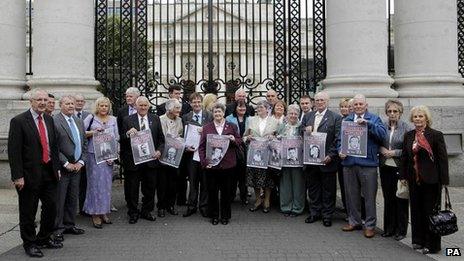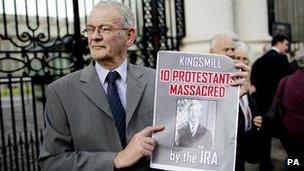Kingsmills victims' relatives unhappy with Taoiseach meeting
- Published

Relatives of the Kingsmills massacre victims travelled to Dublin to meet Taoiseach Enda Kenny
Relatives of ten men murdered in the 1976 Kingsmills Massacre have expressed disappointment following a meeting with the Irish prime minister.
The families said Taoiseach Enda Kenny told them he could not apologise for something done by the IRA.
The relatives said they had hoped he would say sorry for the lack of security and resources put into the investigation.
They have invited Mr Kenny to south Armagh to visit the massacre site.
Before heading to Dublin for their meeting, the relatives laid a wreath at a memorial to the victims in Bessbrook.
'Common enemy'
Mr Kenny said he had invited the families to Dublin so he could hear "at first hand how their lives had been affected by one of the worst atrocities from the Troubles".
"I assured them that there is no hierarchy of victims, and that their concerns are every bit as important to me as the concerns of other victims and their families," he said.
"I told them that the IRA was the common enemy of all of the people of Ireland, of all traditions, north and south, and that their campaign of violence was strongly resisted by successive Irish governments.
"I promised the families that I would reflect carefully on what they told me this afternoon."
Ulster Unionist assembly member Danny Kennedy said it had been a long and detailed meeting.
"He has outlined his initial position and we are not in complete agreement with that," he said.
"Nevertheless, we are prepared to continue to have dialogue."
Victims campaigner Willie Frazer said he was pleased to have met the Taoiseach.
"We made it quite clear to him that we're not asking him to apologise for the IRA, we're asking him to apologise for the Irish government's lack of ability in dealing with the IRA," he said.
Beatrice Worton, whose son Kenneth was murdered in the massacre, said: "It's not his fault, he was only a young lad when all this happened.
"It was the ones before him who should have done something. We left in good humour anyway."
Last year, a report by the Historical Enquiries Team, which examines unsolved murders from the Troubles, found the IRA was responsible for murdering the ten men. One man survived.

Alan Black, the sole survivor of the Kingsmills massacre, was among those who met Mr Kenny
On 5 January 1976, the textile workers were travelling home from work on a minibus in the heart of rural County Armagh.
Shortly after the van cleared the rise of a hill, they saw a man standing in the road flashing a torch.
They stopped and 11 other men, all armed, emerged from the hedges around them.
Their first thought was that it was the Army, but the gunmen were masked.
A man asked the men their religion. There was one Catholic on the bus. He was identified and ordered away from his Protestant work mates. He was able to run off.
The 11 remaining men were then shot. One of them, Alan Black, survived the massacre, despite having 18 gunshot wounds.
The IRA never admitted involvement and was supposed to be on ceasefire at the time.
The South Armagh Republican Action Force claimed the deaths. The HET reinvestigated the killings as part of work spanning three decades of conflict.
- Published13 September 2012
- Published22 February 2012
- Published16 June 2011
- Published21 June 2011